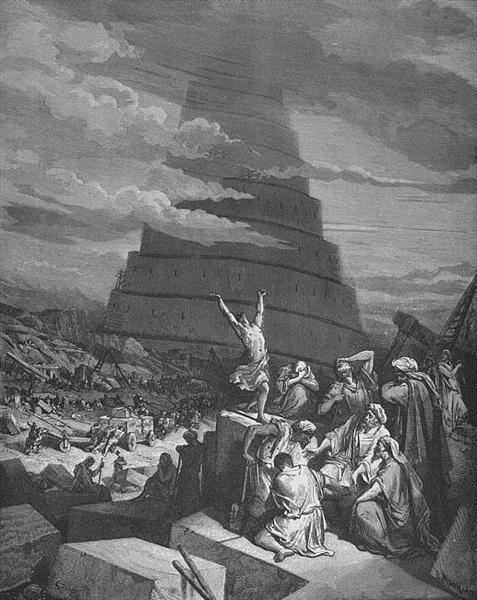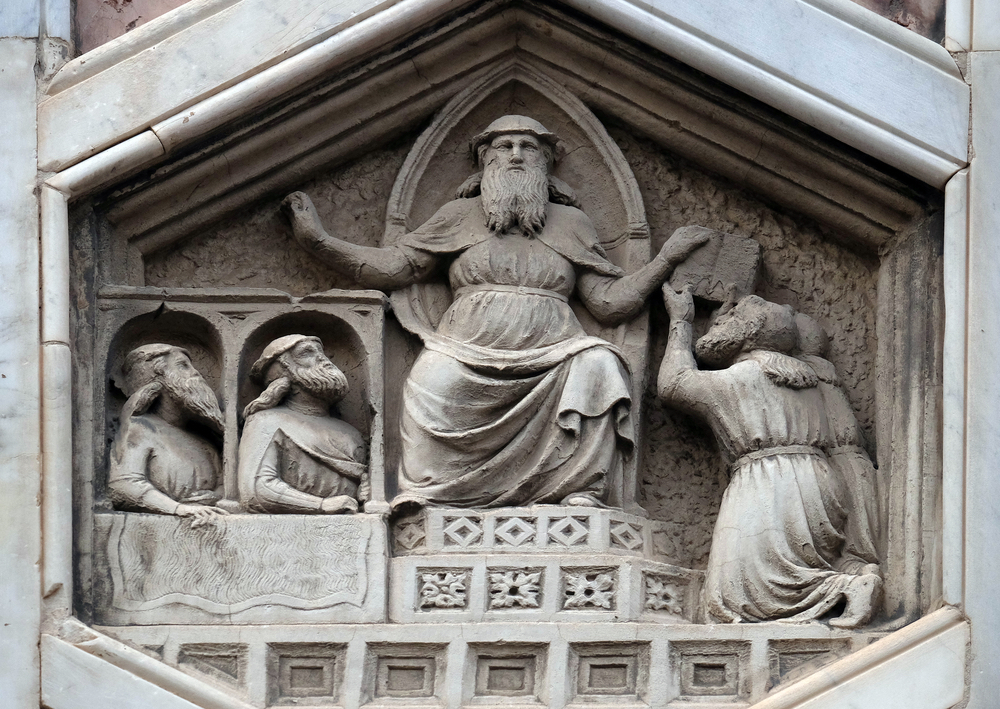Now You’re Speaking My Language (original) (raw)

I’ve written before about the Tower of Babel, the weird story from Genesis that explains why people speak so many different languages. Exactly why this needed a mythical explanation isn’t entirely clear. People speak different languages because they developed in different places and situations. It does seem like the Tower story is a natural extension of the Flood drowning all except eight humans, so all humanity has to be descended from just a few people who then spread out around the world. As such, it makes sense that they’d all speak the same language at first. If people just lived in a bunch of different places in the first place, there wouldn’t be the need for this explanation. It’s narrative consistency, I suppose. The thing is, while the language is the most memorable part of the story, it also involves humans being punished for hubris, and probably something about the origins of civilization. But it’s not just pride that inspires the people, but also fear. They’re afraid of being scattered around the world, which is exactly what happens after God intervenes. Why they were afraid of that in the first place isn’t really clear, but it seems that the tower isn’t just an attempt to reach Heaven, but also a way to be remembered by future generations.
I recently came across a Wikipedia page about various myths for the origin of languages, but I can’t find much else online about some of these stories. The Greek one seems to be authentic, blaming Hermes for the confusion of language. It’s said that there was a time when all people spoke the same language, and they also didn’t need any laws. I suppose a lot of legal practice is about interpreting language. We also don’t know why Hermes wanted to do this, but he’s elsewhere said to be both the creator of language and a trickster. A sort of extension of this myth says that this led to Zeus no longer caring to rule humans directly, so he passed the kingship on to Phoroneus, leaving him to do all that messy legal work.
The general view is that Phoroneus is the brother of Io, hence the son of the river god Inachus. There are some tellings, probably originating in Phoroneus’ home country of Argos, that he was the first man ever. This isn’t entirely consistent with other interpretations, but what is in Greek mythology? The most common explanation seems to be that the Titans Prometheus and Epimetheus created the first humans out of clay, but sometimes Athena and Hermes are also involved in this process. Pandora, made by the Olympians under Zeus, is typically considered to have been the first woman. But Hesiod’s Works and Days is a major source for not only the Pandora story, but also the one about the ages of the world where the first humans lived under Kronos, which means Zeus would either have not been born yet or been in hiding, and Zeus’s children Athena and Hermes definitely wouldn’t have been around yet. There are probably ways to fit these together (maybe Pandora was only the first woman of her age, maybe the first humans reproduced asexually, etc.), but overall I just don’t think it was a major concern. It’s also not entirely clear where the line is drawn. Pandora, a human woman, was married to a Titan, and their daughter and Prometheus’ son repopulated the world after the Flood by throwing a bunch of rocks. And if Phoroneus was the son of a river god and a nymph (although there are variations on this as well), why would he be considered human at all? It does remind me of how C.S. Lewis explained that all the humans in the Narnian world prior to the arrival of the Telmarines are descended from one couple from London, but their children reproduced by marrying nature deities. Wikipedia also compares the story of the Gigantomachy, as described by Ovid, involving the Gigantes stacking mountains on top of each other to try to reach Olympus, which has some similarities to a different part of the Babel story.
It’s said there’s a myth in Australia, originating around Encounter Bay, which is pretty crazy. There was this old woman named Wurruri, who walked around putting out people’s fires for no reason. When she finally died, people decided to celebrate by eating her flesh. Those who ate different parts of her body started speaking different languages. The Wikipedia page mentions an Aztec story of a dove giving different languages to the previously mute children of the survivors of a great flood, and one from the Amazon blaming the separation of people and their languages on someone eating hummingbird eggs. It would be nice to find more details on these, but Google isn’t really bringing up anything. The Aztec flood story seems to mostly appear in nineteenth-century sources; I know there was a reference to it in Ignatius Donnelly’s Altantis: The Antediluvian World. That’s not to say there’s no truth to it, but it seems like the sort of thing that gets spread around without anybody citing a primary source. The Sumerian epic of Enmerkar has a reference to the god Enki being the one responsible for making people speak different languages, and a desire by the titular king to unify them again. I’ve also seen mention of a Hindu myth about a giant tree that covered the whole world and hence united humanity, only for Brahma to destroy it and split it into multiple trees throughout the world, each of which became associated with a particular culture and language. Here, though, it seems to be the tree itself that commits the affront against the natural order. With the cannibalism of the old lady, and possibly the hummingbird eggs, it seems to be people doing something unnatural that leads to the confusion of tongues. In other cases, the original reason isn’t clear, or at least isn’t preserved in the versions we have now. The Babel story is partially about pride, but also indicates that God just doesn’t want everyone working together on something. I’ve also seen the Hindu tree myth interpreted as meaning that Brahma thought everyone being together wasn’t appropriate.
This entry was posted in Animals, Australian, Authors, Aztec, C.S. Lewis, Christianity, Chronicles of Narnia, Greek Mythology, Hinduism, Judaism, Language, Mythology, Native American, Religion, Semitic, South American and tagged athena, atlantis: the antediluvian world, bible, brahma, cannibalism, enki, enmerkar, epimetheus, flood, genesis, gigantomachy, hermes, hesiod, hubris, ignatius donnelly, inachus, kronos, nymphs, olympus, ovid, pandora, phoroneus, pride, prometheus, the magician's nephew, titans, tower of babel, tricksters, works and days, wurruri, zeus. Bookmark the permalink.